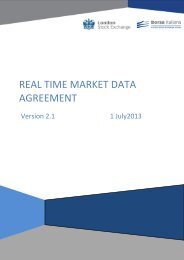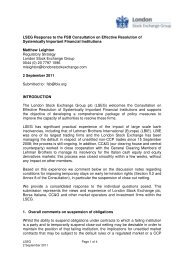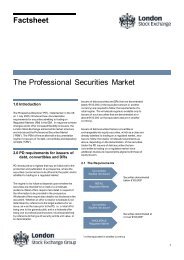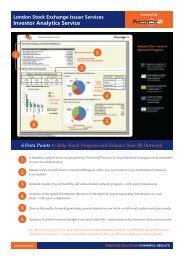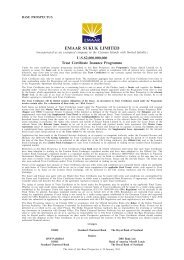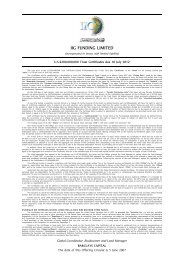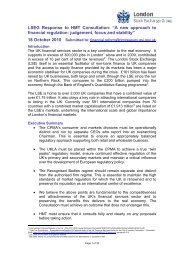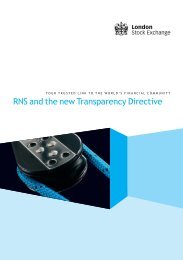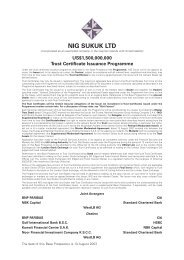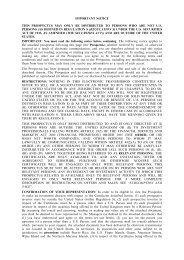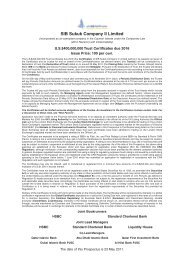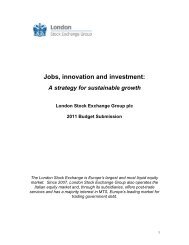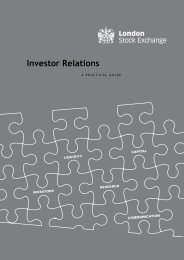LSEG Response to IOSCO Consultation - London Stock Exchange
LSEG Response to IOSCO Consultation - London Stock Exchange
LSEG Response to IOSCO Consultation - London Stock Exchange
You also want an ePaper? Increase the reach of your titles
YUMPU automatically turns print PDFs into web optimized ePapers that Google loves.
Question 7 – What do you perceive as the major causes of settlementindiscipline and settlement failures? What steps, if any, do you believeregula<strong>to</strong>rs should take <strong>to</strong> address these causes?26 We are uncertain as <strong>to</strong> the premise of this question, and note that there is nodiscussion in the <strong>Consultation</strong> paper regarding settlement failure or discipline.Notwithstanding this, if the point of the question is whether HFT and au<strong>to</strong>matedtrading gives rise <strong>to</strong> settlement failure or indiscipline, we do not accept such apremise. There is a popular misconception that intra-day trading, whether HFTor not, has an impact on the shareholding position in the issuers’records/registers; in many cases it does not. In our experience, intra-daytraders rarely hold a large inven<strong>to</strong>ry of s<strong>to</strong>ck, and therefore their trades rarelygo through <strong>to</strong> the settlement process.27 We estimate that approximately 98.4 per cent of all trades settle within fourdays of the Intended Settlement Date (ISD) 8 for all securities that trade on the<strong>London</strong> S<strong>to</strong>ck <strong>Exchange</strong>, and over 99 per cent of trades settle by the ISD inItaly. 9Question 8 – Have the appropriate steps been taken <strong>to</strong> limit or manageconflicts of interest that arise where an investment firm simultaneouslyconducts client-serving activities and proprietary trading or a tradingparticipant is also a shareholder in a venue on which it trades? If you believeconflicts management is inadequate, please explain how this manifests itselfand any recommendation you have for how conflicts management could beimproved.28 We are unaware of any problems that have arisen as a result of a conflict ofinterest. This does not present any particular new problem not already coveredby the existing Conduct of Business rules. We would also make the generalpoint that all firms and platforms should have adequate policies in place <strong>to</strong>manage such conflicts effectively, and that the regula<strong>to</strong>ry compliancedepartment within such firms should be sufficiently independent.Question 9 – Do you think existing laws and rules on market abuse anddisorderly trading cover computer generated orders and are relevant in <strong>to</strong>day’smarket environment?29 In general, we believe that existing laws and rules on market abuse anddisorderly trading in Europe are still relevant and applicable in <strong>to</strong>day’s marketenvironment. Computer generated trading has not, in our view, given rise <strong>to</strong>any new types of abuse, namely the means by which it may be undertaken orthe speed. However, it may be useful <strong>to</strong> have more illustrative guidance andexamples of what may constitute market abuse and disorderly behaviour inmarkets.8 Source: CREST9 Source: Monte Ti<strong>to</strong>liPage 8 of 11



